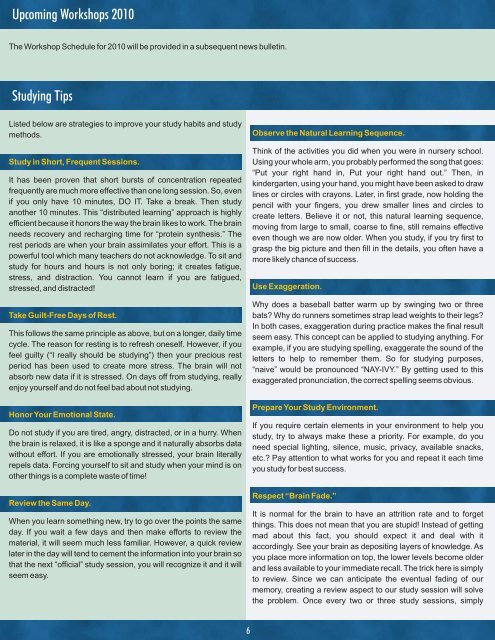IBF - dec09.cdr - The Institute of Banking and Finance Of Trinidad ...
IBF - dec09.cdr - The Institute of Banking and Finance Of Trinidad ...
IBF - dec09.cdr - The Institute of Banking and Finance Of Trinidad ...
You also want an ePaper? Increase the reach of your titles
YUMPU automatically turns print PDFs into web optimized ePapers that Google loves.
Upcoming Workshops 2010<br />
<strong>The</strong> Workshop Schedule for 2010 will be provided in a subsequent news bulletin.<br />
Studying Tips<br />
Listed below are strategies to improve your study habits <strong>and</strong> study<br />
methods.<br />
Study in Short, Frequent Sessions.<br />
It has been proven that short bursts <strong>of</strong> concentration repeated<br />
frequently are much more effective than one long session. So, even<br />
if you only have 10 minutes, DO IT. Take a break. <strong>The</strong>n study<br />
another 10 minutes. This “distributed learning” approach is highly<br />
efficient because it honors the way the brain likes to work. <strong>The</strong> brain<br />
needs recovery <strong>and</strong> recharging time for “protein synthesis.” <strong>The</strong><br />
rest periods are when your brain assimilates your effort. This is a<br />
powerful tool which many teachers do not acknowledge. To sit <strong>and</strong><br />
study for hours <strong>and</strong> hours is not only boring; it creates fatigue,<br />
stress, <strong>and</strong> distraction. You cannot learn if you are fatigued,<br />
stressed, <strong>and</strong> distracted!<br />
Take Guilt-Free Days <strong>of</strong> Rest.<br />
This follows the same principle as above, but on a longer, daily time<br />
cycle. <strong>The</strong> reason for resting is to refresh oneself. However, if you<br />
feel guilty (“I really should be studying”) then your precious rest<br />
period has been used to create more stress. <strong>The</strong> brain will not<br />
absorb new data if it is stressed. On days <strong>of</strong>f from studying, really<br />
enjoy yourself <strong>and</strong> do not feel bad about not studying.<br />
Honor Your Emotional State.<br />
Do not study if you are tired, angry, distracted, or in a hurry. When<br />
the brain is relaxed, it is like a sponge <strong>and</strong> it naturally absorbs data<br />
without effort. If you are emotionally stressed, your brain literally<br />
repels data. Forcing yourself to sit <strong>and</strong> study when your mind is on<br />
other things is a complete waste <strong>of</strong> time!<br />
Review the Same Day.<br />
When you learn something new, try to go over the points the same<br />
day. If you wait a few days <strong>and</strong> then make efforts to review the<br />
material, it will seem much less familiar. However, a quick review<br />
later in the day will tend to cement the information into your brain so<br />
that the next “<strong>of</strong>ficial” study session, you will recognize it <strong>and</strong> it will<br />
seem easy.<br />
6<br />
Observe the Natural Learning Sequence.<br />
Think <strong>of</strong> the activities you did when you were in nursery school.<br />
Using your whole arm, you probably performed the song that goes:<br />
“Put your right h<strong>and</strong> in, Put your right h<strong>and</strong> out.” <strong>The</strong>n, in<br />
kindergarten, using your h<strong>and</strong>, you might have been asked to draw<br />
lines or circles with crayons. Later, in first grade, now holding the<br />
pencil with your fingers, you drew smaller lines <strong>and</strong> circles to<br />
create letters. Believe it or not, this natural learning sequence,<br />
moving from large to small, coarse to fine, still remains effective<br />
even though we are now older. When you study, if you try first to<br />
grasp the big picture <strong>and</strong> then fill in the details, you <strong>of</strong>ten have a<br />
more likely chance <strong>of</strong> success.<br />
Use Exaggeration.<br />
Why does a baseball batter warm up by swinging two or three<br />
bats? Why do runners sometimes strap lead weights to their legs?<br />
In both cases, exaggeration during practice makes the final result<br />
seem easy. This concept can be applied to studying anything. For<br />
example, if you are studying spelling, exaggerate the sound <strong>of</strong> the<br />
letters to help to remember them. So for studying purposes,<br />
“naive” would be pronounced “NAY-IVY.” By getting used to this<br />
exaggerated pronunciation, the correct spelling seems obvious.<br />
Prepare Your Study Environment.<br />
If you require certain elements in your environment to help you<br />
study, try to always make these a priority. For example, do you<br />
need special lighting, silence, music, privacy, available snacks,<br />
etc.? Pay attention to what works for you <strong>and</strong> repeat it each time<br />
you study for best success.<br />
Respect “Brain Fade.”<br />
It is normal for the brain to have an attrition rate <strong>and</strong> to forget<br />
things. This does not mean that you are stupid! Instead <strong>of</strong> getting<br />
mad about this fact, you should expect it <strong>and</strong> deal with it<br />
accordingly. See your brain as depositing layers <strong>of</strong> knowledge. As<br />
you place more information on top, the lower levels become older<br />
<strong>and</strong> less available to your immediate recall. <strong>The</strong> trick here is simply<br />
to review. Since we can anticipate the eventual fading <strong>of</strong> our<br />
memory, creating a review aspect to our study session will solve<br />
the problem. Once every two or three study sessions, simply


